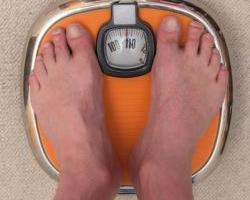How Long Does it Take to Gain Weight After You Eat?
 It’s not uncommon to feel discouraged after having a large meal or going overboard on junk food. You may think that you’re going to see the consequences on the scale right away.
It’s not uncommon to feel discouraged after having a large meal or going overboard on junk food. You may think that you’re going to see the consequences on the scale right away.
True weight gain (which means fat storage, not water weight or weight put on from a heavy meal) is a process that – like weight loss – takes time.
There are many factors that influence how long it will take to gain weight after eating.
Digestion
It can take anywhere from about 6 to 10 hours to fully digest a meal. During that time your body is mostly utilizing energy from glucose and nutrients found in that meal.
After the body enters a fasted state, generally several hours after not eating, energy begins to be drawn from fat stores.
Your overall weight will depend on how well your digestive tract is working, how efficiently your body can utilize glucose (your insulin sensitivity) and the types of food you consume.
Emerging research also suggests that the timing of your meals might affect whether or not you store fat and therefore, gain weight.
Calories
Weight gain depends significantly on the amount of calories you consume.
The common theory is that if you consume more calories than you burn, you’ll gain weight. But this won’t happen overnight, either.
For example, if you were to consume an extra 500 calories per day on top of what you normally eat, you might expect to gain about one pound per week (3,500 calories are in a pound).
Macronutrients
Weight is also largely affected by the types of calories you’re eating.
A diet high in carbohydrates tends to cause more rapid weight gain, as the body is prevented from utilizing energy from fat stores and fat-burning hormones are suppressed.
Low-carbohydrate diets that are high in protein and healthy fat are popular in the weight loss community because they naturally kick the body into a state of ketosis, where the body naturally burns fat for fuel because glucose (sugar or carbohydrates) are not available.
Metabolism
Metabolism is also a factor in gaining weight.
Metabolism is affected by age, genetics, body size, hormonal health and diet.
A person with a “high” metabolism might take longer to put on weight than a person with a lower metabolism.
Keep in mind that weighing yourself after meals does not give you an accurate reading of your true weight, nor does weighing yourself after a long fast or first thing in the morning.
Weight can fluctuate greatly depending on diet, water intake, bowel movements, or stress. Therefore, a better way to track your body composition would be to measure your body fat and muscle mass or to take measurements of areas like your waist, chest, hips or thighs.
Source: SF Gate, GreenLite Medicine
 Eating Disorder Self Test. Take the EAT-26 self test to see if you might have eating disorder symptoms that might require professional evaluation. All answers are confidential.
Eating Disorder Self Test. Take the EAT-26 self test to see if you might have eating disorder symptoms that might require professional evaluation. All answers are confidential.